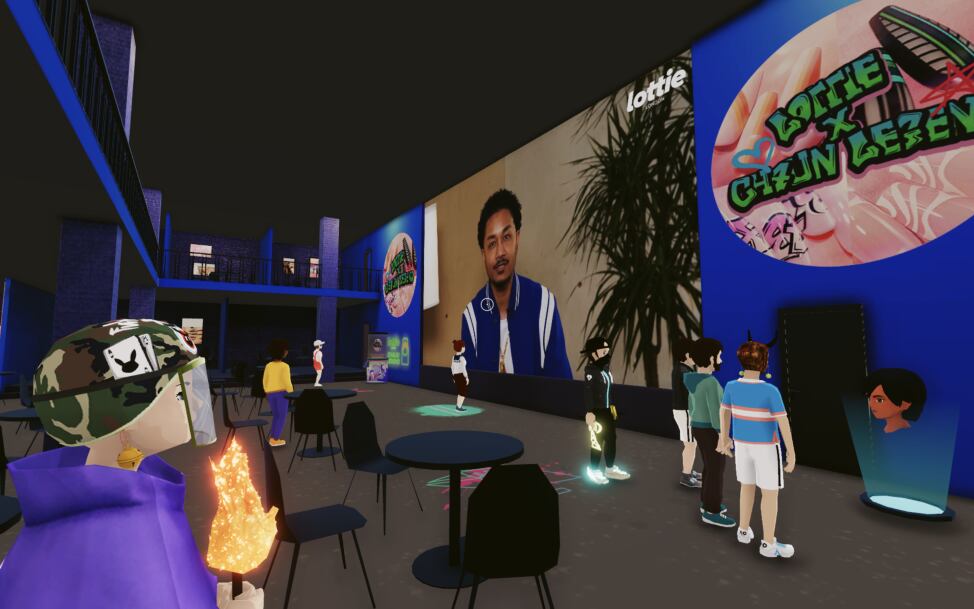The Metaverse is still in its infancy, which means beauty companies have a ‘blank slate’ and the chance to be as innovative as they wish. Yet it’s also unchartered territory that needs a creative and pioneering approach to stand out.
But launching a Metaverse experience is not only the realm of disruptive start-ups – heritage beauty brands and companies have been ploughing budgets into it too.
Elizabeth Arden has just launched a virtual store for browsing, shopping and games. In March, Clinique launched The Clinique Lab, a digital experience with custom-create avatars that can browse and shop for products. While in April, L'Oréal Professionnel launched avatar products for gamers across Ready Player Me, Roblox and Zepeto.
Meanwhile Coty Inc. took a slightly different approach in May and announced it’s creating an internal metaverse for its global staff, the Coty Campus, which will launch this autumn.
Experiences they can’t have in real life
According to Sophie Mitchell, Associate Analyst at Global Data, right now anything is possible in this space and the more innovative businesses can be, the better.
“It’s likely that companies who will succeed are the ones who utilise the Metaverse for brand storytelling and allow consumers to do things with their products here that they would be unable to do in real life,” she says.
Mitchell points to Puig’s perfume brand Byredo as a stellar example.
“Byredo is the first brand to do what seems impossible, making scent digital,” she says. “It partnered with Rtfkt, to create digital ‘auras’ – 26 ingredients that ‘represent different emotions’ and are digital collectables valued in the same way as precious raw materials would be in perfumery. She details how collectors will be able to create customised scents by mixing two of the digital ingredients and the brand will produce a physical bottle of perfume, individually numbered and identified with a type of chip, known as an NFC tag, that will connect it to the collector.
MItchell is equally impressed by the efforts of Japanese skincare brand Tacha, which she says has also “dived into the storytelling element of the metaverse, creating ‘Tachaland’ where gamers can visit an island of rice fields, tea houses and bamboo fields.”
Does the Metaverse really pull in beauty consumers?
The first ever Metaverse Beauty Week is taking place this week across Decentraland, Roblox and Spatial and will feature brands like Ulta Beauty, Neutrogena, Lush and Lottie London.
Nora Zukauskaite, Global Marketing Director at Brand Agency London, parent company of UK-based Lottie London, is excited about its offering at the event – a game on Roblox that will focus on the brand’s viral TikTok products, where attendees can collect tokens and redeem them for real prizes.
Zukauskaite saw positive results with the company’s past Metaverse experiences. “From our previous digital developments and metaverse activations, which we found hugely successful, we expect to see the same success and engagement from consumers,” she says.
She says this audience is mainly Gen Zs and Millennials and that this a good way to connect with these consumers. “Such experiences help us tell our story further and connect beyond just a product while avoiding the limitation of inaccessible locations or time zones like a physical experience would do,” she explains.
A highly creative emerging place
Another UK beauty brand at Metaverse Beauty Week is Lush and it also speaks positively about launching into the realm It had a successful recent experience when it offered a Metaverse version of its Lush House at SXSW festival in Decentraland.
“For the week of SXSW, we had just under 1,000 unique visitors to the Decentraland experience, says Adam Goswell, Head of Technology R&D at Lush. “We can see that visitors to Decentraland really enjoy collectibles in terms of wearables they can ‘dress’ their virtual character in, and they can take these items and wear them in other parts of the Decentraland Metaverse.”
Lush was so pleased with the outcome that Goswell says it even extended its Lush House in Decentraland with an activation for World Bath Bomb Day. It gifted visitors a free NFT for visiting the house, a bespoke piece of art. “We’ve had a good response to people wanting to collect NFTs and hope to do more NFT-related activations in the future, perhaps with ones that have a utility in the future, such as unlocking secret product releases or access to exclusive events.”
Goswell says the brand can see it's a highly creative emerging place for experiences, social and gaming: “It has the feelings of the earlier days of the web so we know it’s going to evolve and develop from what we see today,” he shares.
He reveals that Lush is now looking at other Metaverse platforms such as Sandbox and Spatial, as well as gaming-focus platforms such as Minecraft and Fortine. “We think our audiences already use these platforms and we’re keen to connect to them in a new way,” he concludes.

